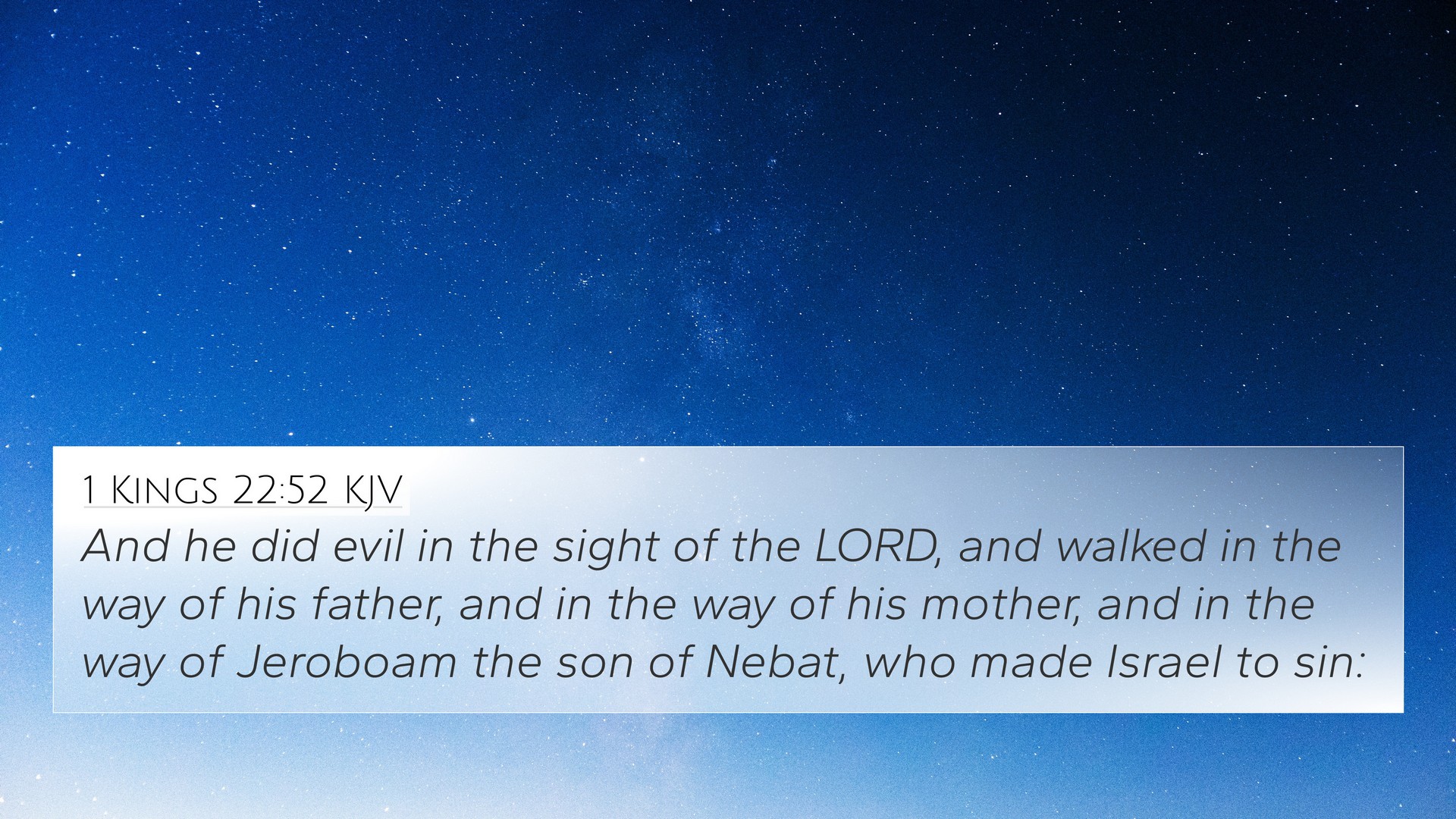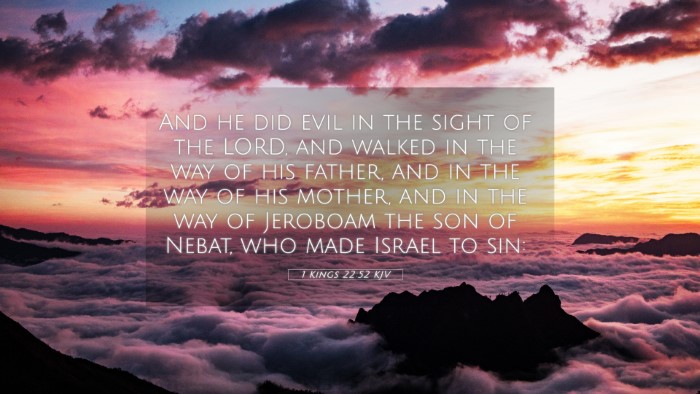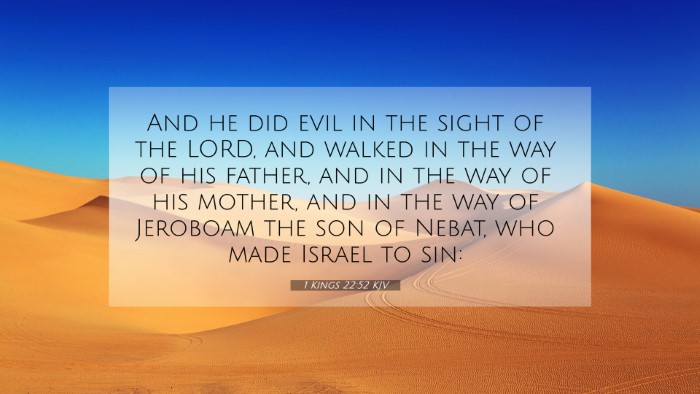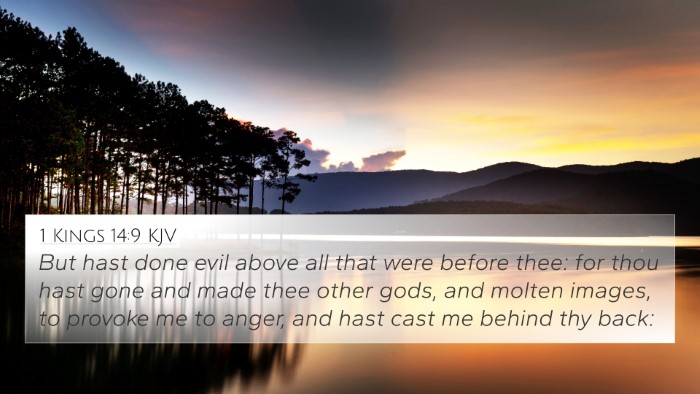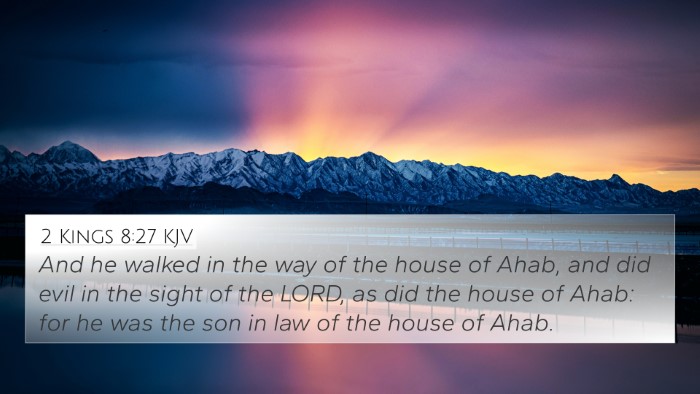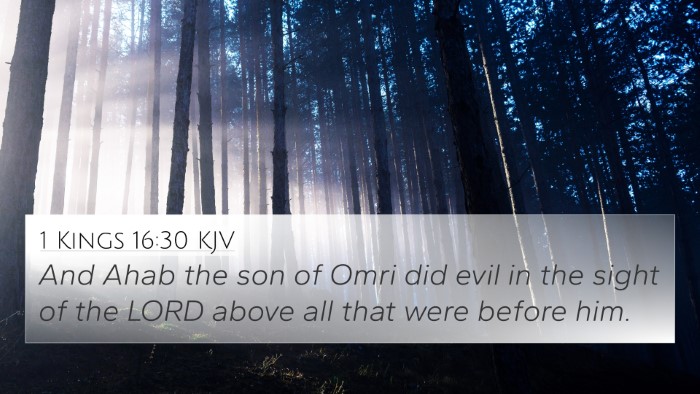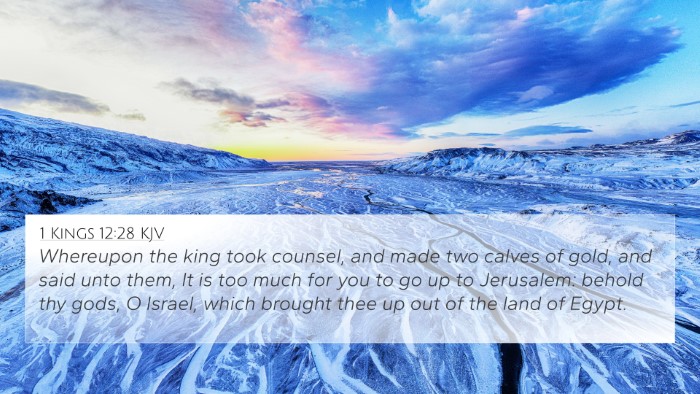1 Kings 22:52 provides a crucial insight into the reign of Ahaziah, king of Israel, indicating his dedication to idolatry and the consequences of departing from God. The verse states:
"And he did evil in the sight of the Lord, and walked in the way of his father, and in the way of his mother, and in the way of Jeroboam the son of Nebat, who made Israel to sin."
This succinct but powerful statement is layered with meaning and historical context, drawing connections to both individual character and the broader narrative of Israelite monarchy.
Meaning and Interpretation
The verse highlights the failure of King Ahaziah to adhere to the worship of Yahweh, emphasizing his alignment with idolatrous practices established by preceding kings. This reflects a persistent theme in the Book of Kings regarding the spiritual condition of Israel and its leaders. Here are the key points derived from prominent public domain Bible commentaries:
- Matthew Henry:
Henry notes that Ahaziah’s actions epitomized the decline of moral standards in Israel, as he "did evil" by emulating both his father Ahab and his mother Jezebel. This suggests a continuation of a legacy of sin that directly opposes God's commandments.
- Albert Barnes:
Barnes emphasizes the phrase "in the way of Jeroboam," indicating that Ahaziah not only followed his immediate family but also the systemic idolatry initiated by Jeroboam, exacerbating Israel's spiritual ruin.
- Adam Clarke:
Clarke interprets the idolatry mentioned as a fundamental reason for the nation's struggles, linking it to the divine judgments that befall those who stray from the worship of the true God. He draws parallels between Ahaziah’s reign and the broader prophetic warnings against such practices.
Contextual Background
To understand this verse, it is essential to consider the spiritual environment of Israel during Ahaziah's reign. The chapter falls within the historical context of a divided kingdom, where kings frequently turned away from Yahweh, favoring Baal worship instead. This setting highlights the challenges faced by prophets like Elijah and Elisha in calling the nation back to repentance.
Cross-References
This verse has strong connections to several other passages in the Bible, reinforcing the themes of idolatry and divine judgment. Below are key cross-references:
- 1 Kings 16:30-33: Discusses king Ahab’s evil actions and how he promoted Baal worship.
- 2 Kings 1:2-4: Details Ahaziah’s inquiry of Baalzebub, further demonstrating his reliance on false gods.
- 1 Kings 12:28-30: Relates to Jeroboam’s establishment of idol worship in Israel.
- Exodus 20:3-5: Highlights God’s command against having other gods, reinforcing the seriousness of Ahaziah's sin.
- 2 Kings 2:1-15: Contains the transfer of prophetic authority which stands in contrast to the reign of Ahaziah.
- Micah 6:16: A prophetic condemnation of the practices and paths of Israel's kings.
- Isaiah 1:4: Critiques Israel as a nation that has revolted and become laden with sin, reflective of Ahaziah’s leadership.
- Jeremiah 2:13: Speaks about the forsaking of the true God for broken cisterns, paralleling Ahaziah’s choices.
- Hosea 4:17: Warns against Ephraim's association with idols, illustrating the broader implications of idolatry in Israel.
- Romans 1:21-23: Discusses modern parallels where humanity turns to idolatry, bridging Old and New Testament teachings.
Thematic Connections
The overarching theme of this verse can be considered within the framework of idolatry versus fidelity to God. The historical accounts of Ahaziah's actions are mirrored in numerous New Testament references, where the call to forsake idols remains ever relevant. For instance:
- 1 Corinthians 10:14: Aligns with this theme by urging believers to flee from idolatry.
- 1 John 5:21: Offers a clear exhortation to keep oneself from idols, resonating with the lessons of the Old Testament.
Conclusion
In summary, 1 Kings 22:52 serves as a poignant reminder of the spiritual and moral trajectory of Israel under Ahaziah's reign. It reveals how the legacy of sin perpetuated by leaders impacts the nation, providing a valuable lesson for contemporary believers. This verse invites readers to engage in Bible verse cross-references and explore the vital connections between scripture. By utilizing tools for cross-referencing and Bible study resources, individuals can deepen their understanding of the Bible's unified message and how various texts reflect similar themes.
Through careful examination and comparative Bible verse analysis, we gain insights into the heart of God's desire for His people, drawing parallels between the Old and New Testaments, and emphasizing the continual relevance of scripture in a world faced with its own idols.
